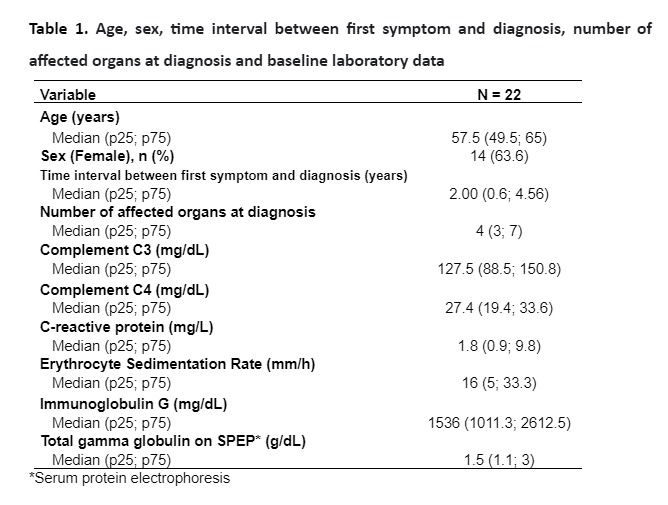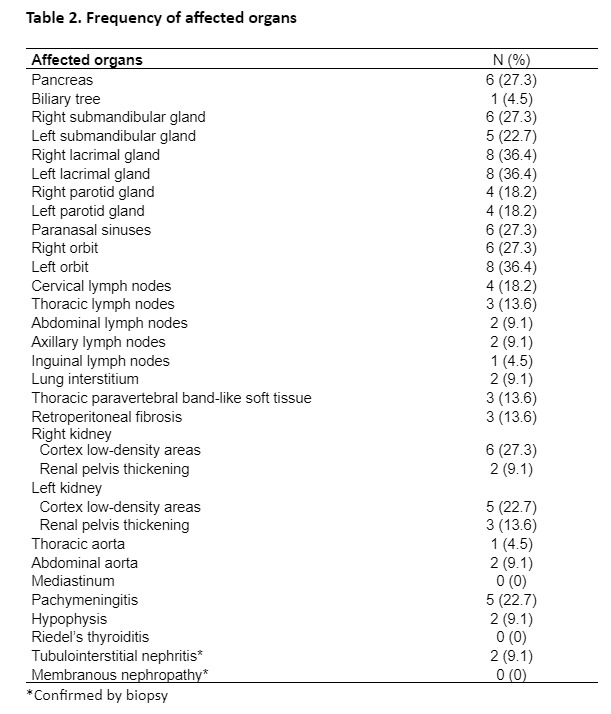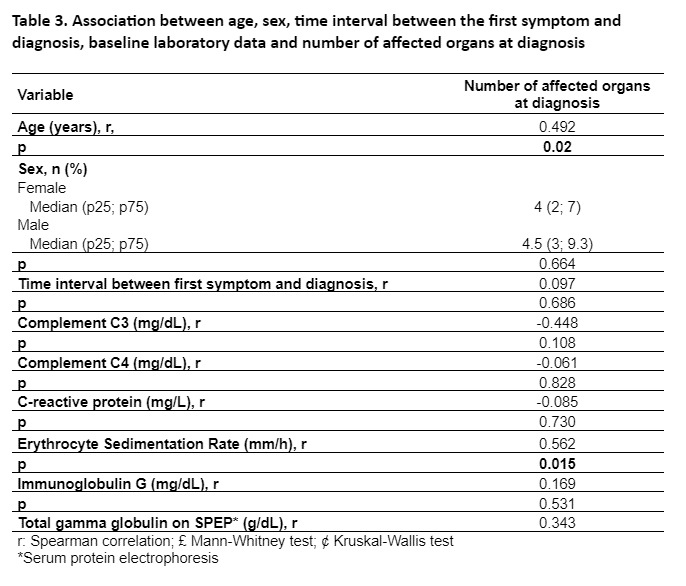Session Information
Session Type: Poster Session C
Session Time: 10:30AM-12:30PM
Background/Purpose: Immunoglobulin G4-related disease (IgG4-RD) is a fibroinflammatory condition primarily affecting middle-aged males. It is characterized by mass lesions affecting various organs, such as the pancreas, lacrimal glands, salivary glands, retroperitoneum, aorta, biliary tree, and lymph nodes. Diagnosis involves a comprehensive assessment of clinical features, imaging findings, histological evaluation, and elevated serum IgG4 levels. Few studies have explored the relationship between clinical and demographic features and disease extension at the time of diagnosis.
Our study aimed to assess the association between demographic data (age, sex), baseline laboratory tests (C3, C4, C-reactive protein (CRP), erythrocyte sedimentation rate (ESR), total IgG, total gammaglobulin in serum protein electrophoresis), time interval between symptom onset and diagnosis (in days), and the number of affected organs at diagnosis in a Brazilian cohort of IgG4-RD patients.
Methods: We conducted a retrospective analysis using a medical electronic database from a Brazilian tertiary center. Inclusion criteria encompassed individuals aged over 18 with IgG4-RD, classified according to the 2019 ACR/EULAR criteria. Qualitative data were presented using absolute and relative frequencies, while quantitative data were described as median and quartiles. Spearman correlations were calculated for age, baseline exams, and the time interval between symptom onset and diagnosis, with the number of affected organs. Tests were conducted with a significance level of 5%.
Results: Twenty-two IgG4-RD patients were enrolled, with the majority being females (64%) and a median age of 57.5 (49.5; 65) years. The time interval between symptom onset and diagnosis was 732 (220; 1651.8) days. At presentation, the average number of affected organs was 4 (3; 7), with lacrimal glands (36.4%) and the left orbit (36.4%) being the most commonly affected organs. Age (r = 0.49, p = 0.02) and ESR (r = 0.562; p = 0.015) exhibited a significant positive correlation with the number of involved organs at diagnosis. No correlation was found between sex, time interval between symptom onset and diagnosis, C3, C4, total IgG, or gammaglobulin levels and disease extension at diagnosis in our study.
Conclusion: In our cohort, older age and higher ESR were associated with a higher number of affected organs at IgG4-RD diagnosis. This data suggests that older patients and those with elevated ESR levels should undergo careful examination and screening for all possible organic involvement at the time of diagnosis.
To cite this abstract in AMA style:
Clemente H, Bayeh B, Aquino M, Lopes F, Freitas T, Cordeiro R, Giardini H. Older Age and Higher Erythrocyte Sedimentation Rate Are Associated with Increased Disease Burden at Diagnosis in a Cohort of IgG4-Related Disease Patients [abstract]. Arthritis Rheumatol. 2024; 76 (suppl 9). https://acrabstracts.org/abstract/older-age-and-higher-erythrocyte-sedimentation-rate-are-associated-with-increased-disease-burden-at-diagnosis-in-a-cohort-of-igg4-related-disease-patients/. Accessed .« Back to ACR Convergence 2024
ACR Meeting Abstracts - https://acrabstracts.org/abstract/older-age-and-higher-erythrocyte-sedimentation-rate-are-associated-with-increased-disease-burden-at-diagnosis-in-a-cohort-of-igg4-related-disease-patients/



